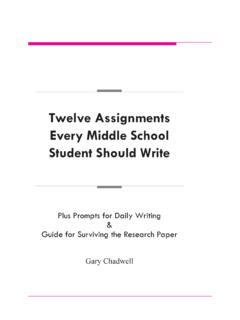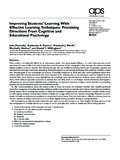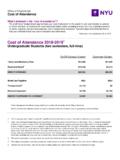Transcription of Strategies to Help Students Who are Failing - gphillymath.org
1 Strategies to help Students Who are Failing * Sherry Fraser During my visits to IMP classes this fall, and via e-mail, I have been asked about school-wide Strategies to help IMP kids who are Failing . Some of our IMP schools have large numbers of 9th and 10th graders who are not being successful. I remember a few years ago there were a couple of schools that had an extra "booster class" or "homework class" for Students who needed the time during the school day in order to keep up with the work. Would you please post to this listserv Strategies that you or your school have developed that have been successful in helping kids be successful? Thanks. * Michael Endress on November 3, 1998: We have been offering classes in the "off" semester. By that, I mean we are currently offering IMP 2 during semester 2.
2 For many of our Students , the immediate repeat of the material they did not get the first time through is enough of a help . Several Students who failed the first time through are now getting A s or B s. Even those who really struggled are sticking with it and finding success (for them) by earning passing grades. * Janice A. Bussey on November 4, 1998: Many schools run math labs or tutorials during lunch and after school. They are "manned" by math teachers or older math Students who are doing community service of some kind. This addresses the fact that so often, Students fail IMP because they do not do their homework. I have seen schools successfully REQUIRE at-risk or Failing Students to put a set number of hours in the math lab so that they can get support, complete their work, and bring their grades up.
3 * Betsy Adams on November 4, 1998: At our school, Students who received a "D" during their freshmen or sophomore years are enrolled in a required math lab that meets twice a week. The teacher in charge of the "lab" is one of the IMP teachers. That person monitors both homework and POW exploration for those Students . * Karen Radcliff on November 5, 1998: Fortunately, our school has an ELP (Extended Learning Period) built into the day. ELP is a 35-minute period when Students can choose to go to a tutorial, homework room, club meeting, or new class. This is when we offer an IMP 2 honors option once a week. We also have ongoing tutorials for Students going on in a classroom with a teacher. Also, the IMP teachers have volunteered their time after school from 2:15 - 3:00 for tutorials. We all sign up for one or two afternoons during a month.
4 There is a calendar posted in each classroom, and all the counselors have a copy of the calendar. (I think they give it out more than the teachers do.) This is always the first line for getting help . Students in CSF (honors club) also offer tutorials for money. This is their fund-raiser. Many of the CSF Students have gone through IMP and feel very confident tutoring Students in both traditional and IMP math classes. I hope this helps spark some more ideas on helping our kids! * Cindy G. Phillips on November 3, 1998: We find that, at our school, there are many kids who fall into the category of Students who could do the work, but choose not to do the work. For those Students , we create a set of assignments that must be completed over the summer in order for the Students to receive credit. Essentially, the Students are given time to create a passing portfolio for the year.
5 * Michael Soguero on November 7, 1998: I am curious about teachers' efforts to discern what, if anything, Students have learned as a result of doing assignments. Is there an assumption that the doing is equal to learning? If so, how is this reconciled with a constructivist view of how people learn? I am skeptical that we can look at assignment responses and say that we now know what a child knows or understands. I am afraid that most portfolios are really glorified ledgers, an accounting approach to education where assignments get checked off. Is it possible for Students to learn something mathematically or, more importantly, to come to understand something new without having done the homeworks? I am curious about all of the above. It has been my personal project for years to get to the heart of this.
6 * Janice A. Bussey on November 11, 1998: I found the above conversation intriguing. In my own IMP classroom, I find the BEST way for me to discern what mathematics a child has learned is to TALK to him and to LISTEN to him. During discussions and oral presentations in the class, I can question and listen in order to tell what a student understands mathematically and what he has learned. While most Students need the experiences of the homeworks to reach their learning potential, I also have had Students who gained a lot of mathematical understanding just by actively participating in the classwork, the class assignments, and the class discussions. These Students may choose not to do homework. These may be the kinds of Students about whom Cindy is talking. I have determined the best thing for these kids is to let them take the next level of IMP, because I can tell informally that they have learned enough to continue on.
7 On the other hand, because I also live in a world plagued by objective grades, these Students may not have demonstrated their learning with enough work turned in and may have failed a particular year of IMP. The Students often repeat the failed math course in order to get credit and replace the Failing grade. I do not really like this method; having repeaters in an IMP class is not always the best thing. I kind of like Cindy's idea. * Brent McClain on November 12, 1998: Janice, you expressed yourself very well! I tend to agree with you. I remember a student who failed IMP 2 because of his lack of work. I let him move on to IMP 3 the next year. He was in my class again, and he received an A for the first quarter. I always knew he had learned things and could do much of the math, because he participated very well and gave presentations to the class about ideas he had on many problems.
8 Like you said, I LISTENED to him. The problem with his grade was that he did NO homework and was often gone for end of the unit assessments. I am sure that had I made him repeat IMP 2, he would have dropped math altogether (probably rightfully so; he would have been tremendously bored). Of course, there are other Students who should retake the year. It just depends on the reason for their failure. I try to ask myself of each student, "Can ___ be successful if he/she moves on to the next year?" If I answer myself with something like, "Yes, if he/she does the homework and turns in work," then I will move him/her on. If, however, I think that I am setting him/her up for failure by moving on (because there are significant gaps in understanding and many misconceptions), then I do not move him/her on.
9 Of course, regardless for the reason for failure, if a student has not passed, there will be gaps in understanding. For me, the question is Has the student shown me enough for me to think that these gaps can be overcome (especially if homework behavior changes)?" * Jim Gilmore on November 12, 1998: Brent makes a good point, but how can we make exceptions for some and not for the others? On paper, two Students could look identical, but intellectually, they could have very different capabilities. I believe there must be a number of Students who wonder why they are being held back to repeat the class they failed, while others were chosen to move on to the next level of IMP. It looks like preferential treatment or playing favorites. Would your administration go to the wall with you to support you?
10 Shouldn't the student who chose not to do homework live with the consequences? There ARE consequences for our actions. What do we teach the Students who get to move on? I believe that we teach them that it is okay not to do homework if they choose not to. Apparently, one school decided that since they were not getting any homework back, they would no longer assign any. I hope we hold our Students to higher standards. * Cindy G. Phillips on November 12, 1998: My Fellow IMPsters, This is the second time I have felt that I have to defend my actions on this listserv!! I do not feel that a student's written work is solely representative of what he/she knows. In fact, that is the reason our school only gives this "make-up" opportunity to a few Students - those who we feel truly understood the work but chose not to do the work.




